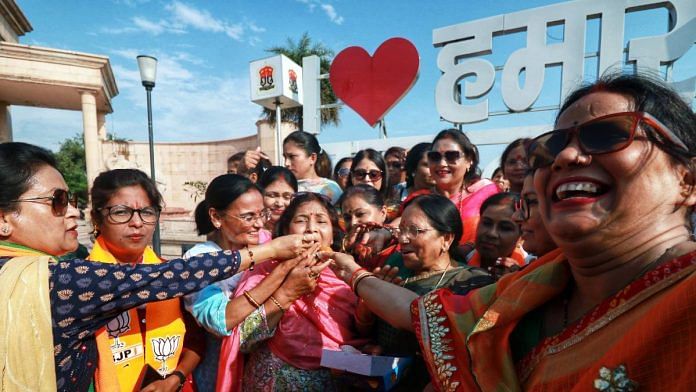New Delhi: The gender imbalance was glaring when Mizoram’s ruling Mizo National Front (MNF) unveiled its list of candidates this week for the upcoming assembly elections. Out of the 40 candidates, a mere two are women. It’s still a step-up from the 2018 polls when not a single woman contested on an MNF ticket.
Down south in Telangana, which also goes to polls this year, it’s a similar story. The Bharat Rashtra Samithi (BRS), which had protested in Delhi earlier this year for the women’s reservation bill, fielded only six women candidates in its list of 115, accounting for a mere 5.2 percent representation.
But it’s not just the MNF and BRS. An analysis of ticket distribution by major regional parties in the last two state elections reveals a reluctance to field women candidates.
Thirteen of the 14 regional parties analysed by ThePrint fielded fewer than one-sixth, or 16.66 percent, women candidates in their last two assembly elections.
This includes parties that vocally supported the women’s reservation bill, from the Dravida Munnetra Kazhagam (DMK) in Tamil Nadu, where just 5.8 percent of candidates were women in 2021, to the Biju Janata Dal (BJD) in Odisha with 13.01 percent in 2019.
The only exception was the Janata Dal-United or JD(U), which fielded 19.13 percent women candidates in Bihar’s 2020 assembly polls. The second-best was the Trinamool Congress (TMC), fielding 16.55 percent women candidates in 2022, just shy of the one-sixth mark.
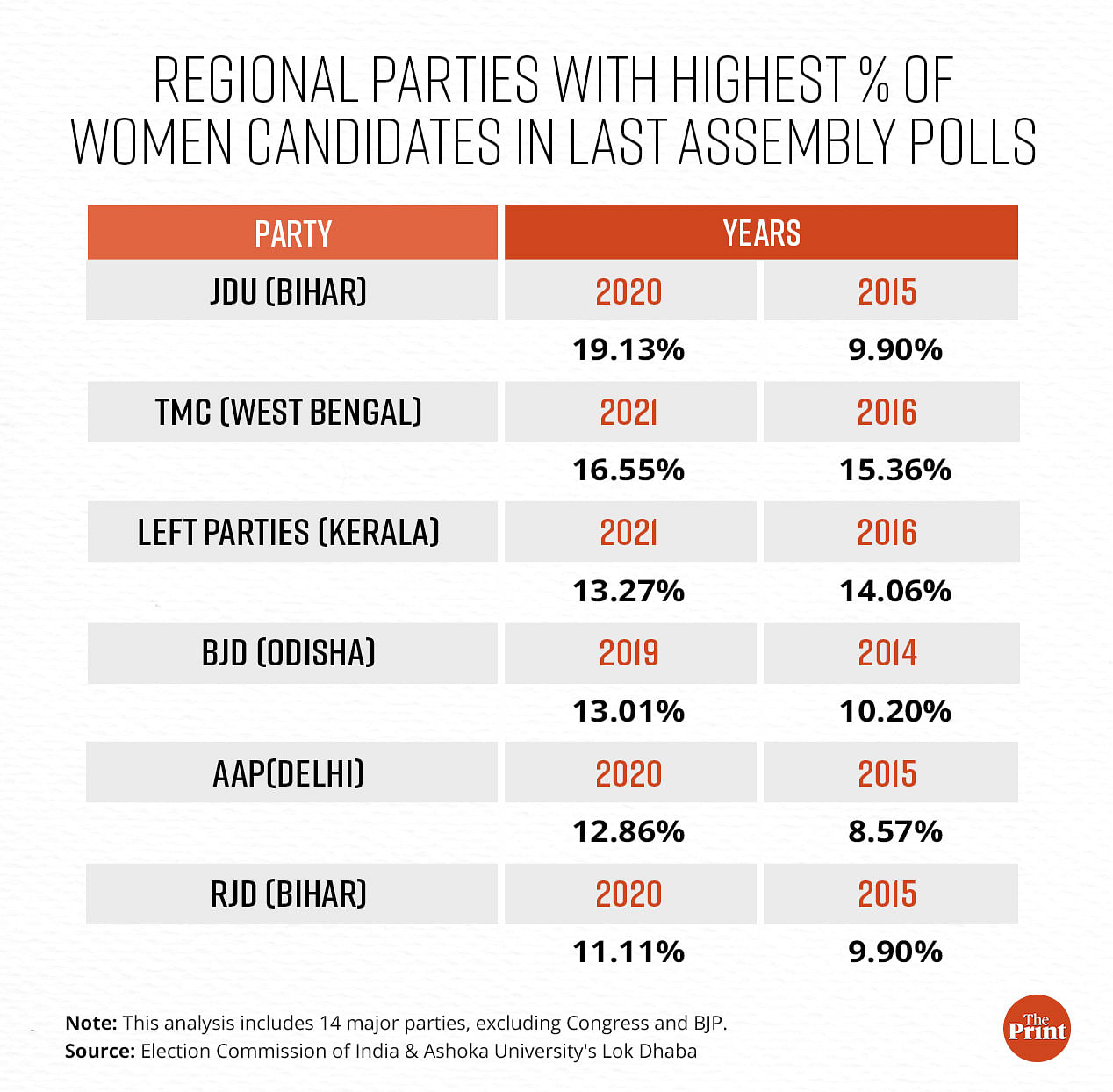
Political analyst Badri Narayan told ThePrint that many parties hesitate to give women tickets because they believe women lack the necessary “capacity” and “strength”.
“Even if women come forward seeking tickets, they are not given a ticket. They are not considered winnable candidates,” he said. Narayan added that once the law for reservation for women takes effect, there will be a shift.
The women’s quota bill, proposing one-third reservation for women in Lok Sabha and state assemblies, received the President’s assent on 29 September— nearly three decades after it was first introduced in Parliament.
However, there’s a catch. The bill, now an Act, lacks a clear timeline for implementation. It’s expected to kick in only after the next census and the subsequent constituency delimitation, which means it won’t apply until the 2029 Lok Sabha election.
“Once the bill is implemented, parties will have to give tickets to women,” Narayan said. “But yes, it will take time.”
Several women leaders, grappling with lack of representation in their own parties, told ThePrint they are holding out hope.
“For every party it is a struggle. It is a huge struggle even for the leadership, and down the ranks it is very very difficult,” said DMK MP Kanimozhi Karunanidhi, a vocal proponent of women’s reservation, despite her own party’s less than stellar representation for women in polls.
“A bill which will be implemented will definitely make a difference,” she said, although she expressed doubts over whether this would happen.
Best, worst & improved
ThePrint conducted an analysis of ticket distribution among 14 prominent regional political parties, each with a minimum of 40 MLAs in their respective assemblies, over the past two state elections they contested.
This analysis also included the Aam Aadmi Party (AAP), which was a Delhi-based party until it won in Punjab and also made gains in Gujarat and Goa. Additionally, the Bahujan Samaj Party (BSP), a national party led by a woman, was also included in the study.
The others were the TMC in West Bengal, the BJD in Odisha, the JD(U) and Rashtriya Janata Dal (RJD) in Bihar, Left parties in Kerala, the BRS (formerly TRS) in Telangana, the DMK and AIADMK in Tamil Nadu, the Yuvajana Sramika Rythu Congress Party (YSRCP) in Andhra Pradesh, the Nationalist Congress Party (NCP), the now-split Shiv Sena in Maharashtra, and the Samajwadi Party (SP) in Uttar Pradesh.
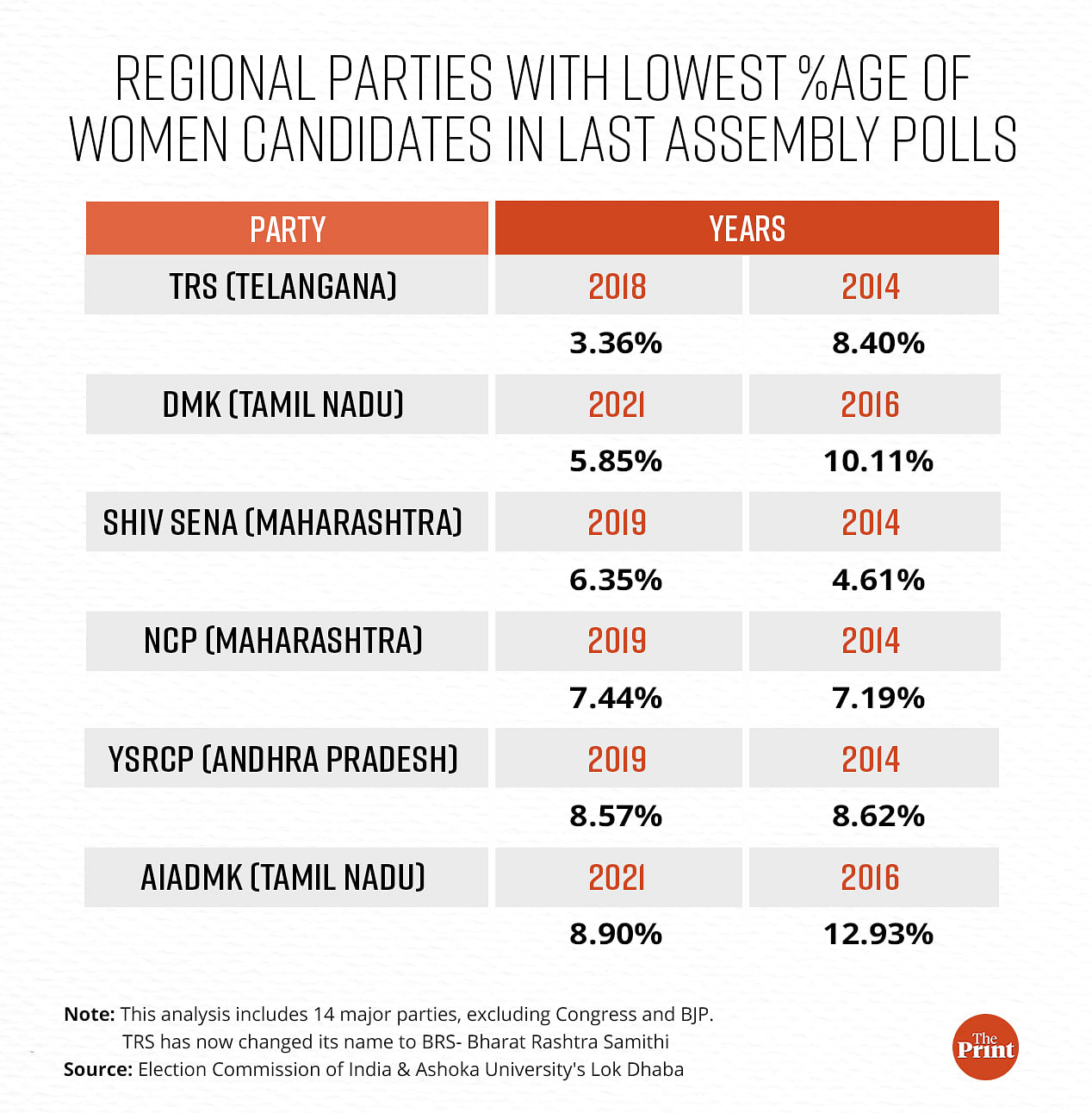
In the total 28 state elections contested by these 14 parties, women constituted less than one-sixth of all candidates across the board, with the notable exception of the JD(U).
This might come as a surprise to those who have followed the party’s stance on the women’s reservation bill over the years.
In 1997, the late Sharad Yadav opposed the bill, questioning if it aimed to bring in only “parkati” women, a derogatory term for educated women with short hair. In 2009, he even threatened to consume poison if the bill was passed without an OBC sub-quota.
In 2010, differences between Yadav and Bihar Chief Minister Nitish Kumar on this issue even led to speculation of a split within the party. However, Yadav left the JD(U) in 2017, and in the next election, the party showed a significant shift. The JD(U)’s allocation of tickets to women doubled in the 2020 state polls to 19.13 percent, from 9.9 percent in 2015.
Another party that showed significant improvement was AAP, especially in Delhi. The party nominated 8.57 percent women candidates in 2015, which increased to 12.86 percent in 2020. In the Punjab elections, women candidates received 10.2 percent of the party’s tickets, up from 8 percent in 2017.
Among all 14 parties, the Shiv Sena had among the lowest percentage of women candidates in the last two elections. On average, only 5.15 percent of their candidates were women across both elections. In 2019, they fielded 6.3 percent women candidates, a nearly 2 percentage point increase from 2014.
More talk, less action?
Most regional parties, except for the All India Majlis-e-Ittehadul Muslimeen (AIMIM), supported the women’s reservation bill in Parliament. But their track record of ticket distribution tells a different story.
The BRS is a case in point. It actively campaigned for the women’s reservation bill early this year, with K. Kavitha, a BRS MLC and daughter of Telangana Chief Minister KCR, even staging a hunger strike at Jantar Mantar in New Delhi.
“Empowering women in the legislative discourse cannot be demanded, it must be guaranteed particularly by the Government,” she had posted on Twitter (now X) at the time.
However, in the 2018 state election the party allocated a mere 3.3 percent of its tickets to women candidates — a drop of five percentage points from 2014.
The 5.2 percent of tickets allocated to women for 2023 is a tad better, but falls far short of the 33 percent that the women’s reservation law envisages.
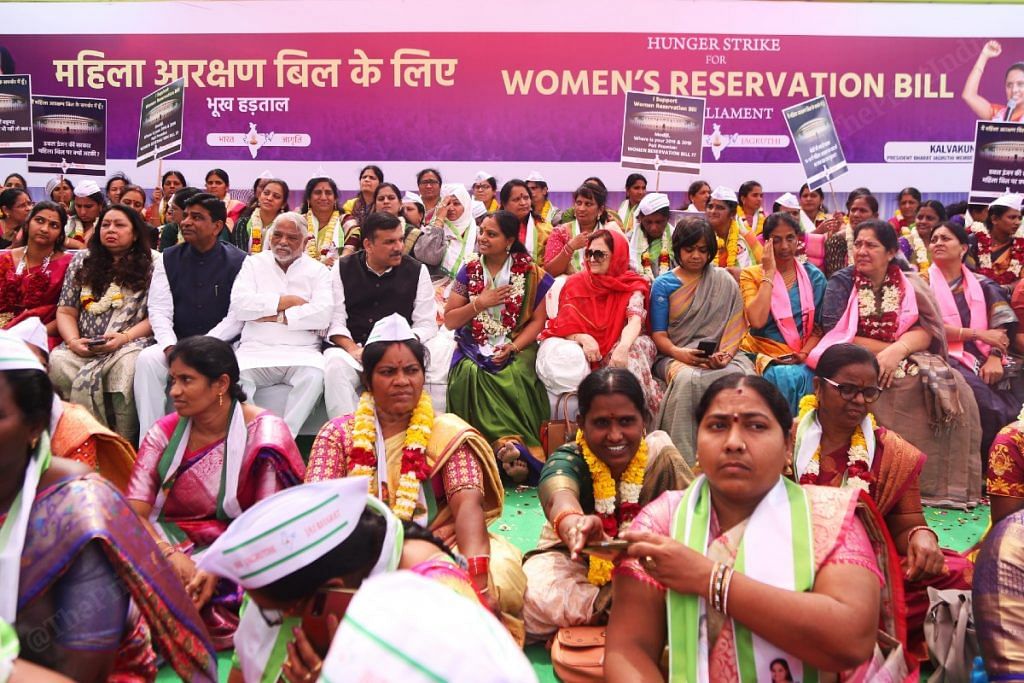
Another party that has claimed to champion women empowerment is Naveen Patnaik’s BJD. Ahead of the 2019 Lok Sabha elections, Patnaik had announced his intention to send 33 percent of women to Parliament. Following through, the party gave seven out of 21 (33 percent) Lok Sabha tickets to women, five of whom won.
However, in the simultaneous state elections that year, the BJD fielded only 13 percent women candidates.
Then, there is the DMK. In 2017, it organised a major rally demanding the early passage of the women’s reservation bill, with politicians and activists from across the country joining in. At the time, DMK MP Kanimozhi Karunanidhi had said that it was high time to make the BJP government accountable for promises. “We, from the DMK women’s wing demand 33 percent reservation for women in Parliament and state legislatures,” she had proclaimed.
However, the DMK itself is far from meeting this standard. The party fielded 10.11 percent women candidates in the 2016 election, which nearly halved to 5.85 percent in 2021.
Similarly, the NCP, whose leader Supriya Sule was at the forefront of the demand for women’s reservation, had a low representation of women candidates. In 2019, it fielded 7.44 percent women candidates, and in 2014, it was 7.19 percent.
What about women-led parties?
Are parties led by women likelier to distribute tickets in a more equitable manner? To answer this question, ThePrint analysed the ticket distribution of the TMC and the BSP.
Led by Mamata Banerjee, Trinamool has been vocal about its support for the women’s quota. Trinamool MP Mahua Moitra even went so far as to declare Mamata as the “mother of the women’s quota bill”.
Speaking in Parliament last month, Moitra contrasted the BJP government’s actions unfavourably with Mamata’s.
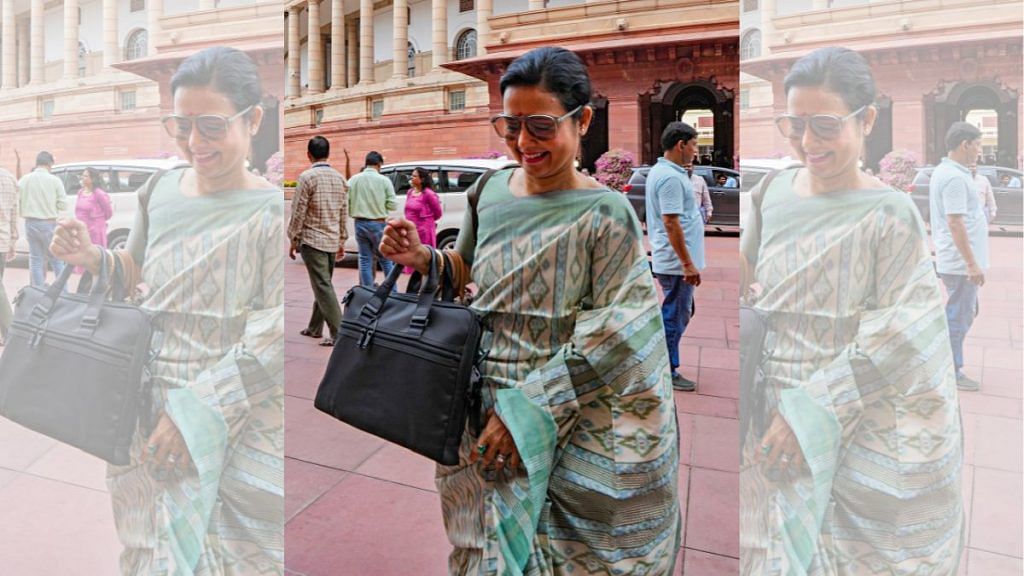
“She (Banerjee) has given birth to the original idea as she has unconditionally sent 37 percent women MPs to Parliament. What this government has brought today is not a women’s reservation bill but a women’s reservation rescheduling bill and should be renamed as such,” Moitra declared.
But while TMC did field over a third of women candidates during the 2019 Lok Sabha elections, resulting in over a third of TMC MPs in the lower house being women, the same commitment was not evident in the assembly elections.
During the 2021 state polls, the percentage of women candidates receiving TMC tickets was only 16.55 percent. Nevertheless, this statistic is still better than most other regional parties.
This, though, cannot be said for the BSP, led by Mayawati. In the last two UP elections in 2017 and 2022, Mayawati’s party nominated only 5.26 percent and 9.16 percent women candidates respectively.
Also Read: BJP’s women candidates have outperformed men in most Lok Sabha polls since 1998
‘It’s very difficult to find space’
Male-dominated parties rarely encourage women’s participation, even when they depended on women votes, pointed out Ranjana Kumari, director, Centre for Social Research, and the author of several books, including Women in Politics: Forums and Processes.
She characterised Indian political parties as patriarchal, male-dominated entities within a democratic system. “Women leaders are active in the ranks and files but their role remains very marginal in the political party. Men think it’s their domain,” she said.
Apart from these concerns, Kumari noted that women face the additional challenge of “character assassination”.
“Since there are very few women in politics, people tend to talk about their physical traits rather than their leadership abilities. This has discouraged many women from entering politics,” she added.
Kumari also pointed out that regional parties have been more hesitant to field women candidates than national parties. “That is why the percentage of women in state assemblies is much less than in the national Parliament,” she said.
Women leaders who spoke to ThePrint agreed that men dominated politics, including in their own parties.
“It is the space of power. It is a space that has not been shared with women. It is a bigger struggle because they (men) don’t want to see women who can speak, women who are independent, women who have their opinions. It is very difficult to find space there,” DMK’s Kanimozhi Karunanidhi said.
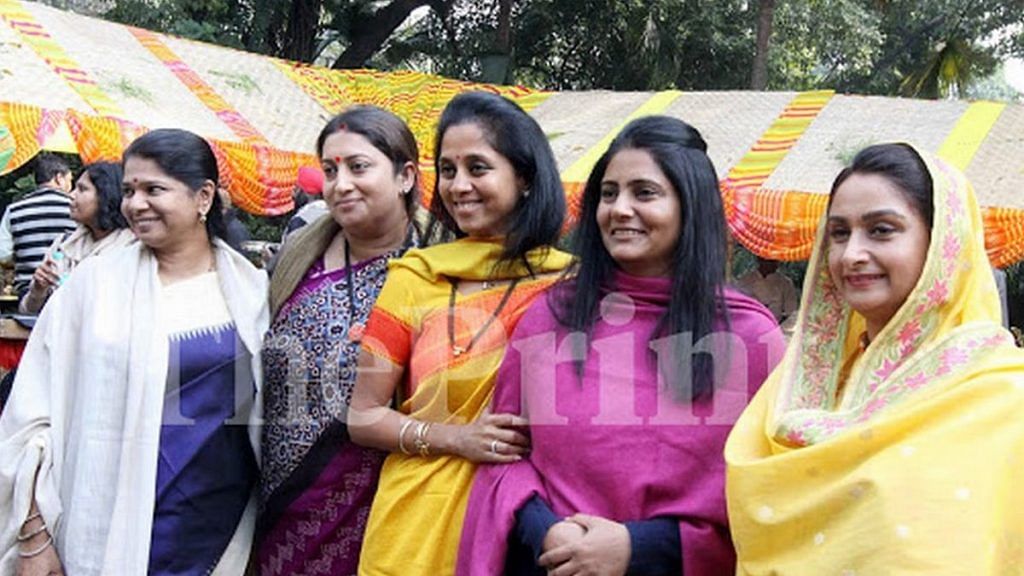
Juhi Singh, the spokesperson for the Samajwadi Party and the head of its women’s wing, told ThePrint that though things were “improving”, there was a long way to go.
“The political landscape has not been women friendly. It is very patriarchal,” she said.
According to her, established women leaders should also do more to support other women in the party. “Even for women who have been successful in the sphere of active politics, for them to do some hand-holding or mentorship of women from different sections has been lacking,” she said.
Singh is sceptical about the women’s reservation law, but thinks it can still compel change.
“There is no way that the bill had been brought with an intention to implement it. But at least every party will have to walk the talk of giving tickets to a certain number of women in the coming elections,” she said.
The Samajwadi Party fielded 12.1 percent women candidates in 2022 and 11 percent in 2017.
Former Member of Parliament and Trinamool spokesperson Kirti Azad told ThePrint that regional parties need to “take a leaf” out of his party and bring women to the forefront.
On women’s lower presence in the Trinamool’s assembly candidate list, he said: “It’s quite possible that we didn’t have candidates at the time. If we’d had candidates, they would have been put up.”
Ranjana Kumari said that even women being at the helm has not guaranteed greater representation. She pointed out that many such leaders, with exceptions such as Mamata Banerjee and Sushma Swaraj, were able to rise to the top only with the backing of a powerful man.
“Mayawati had the support of Kanshi Ram. That’s how she managed. The stories of Jayalalithaa and Sonia Gandhi are similar. They had to depend on a support base. And the parties are by and large controlled by the male leadership,” Kumari said. “Even for women leaders, it was a kind of compulsion of politics to promote similar patriarchal norms in the party.”
Now, that compulsion will change, even if it may happen a few years down the line.
(Edited by Asavari Singh)
Also Read: Modi’s Women’s Reservation Bill has an OBC-sized oversight. Undermines inclusivity, fairness


